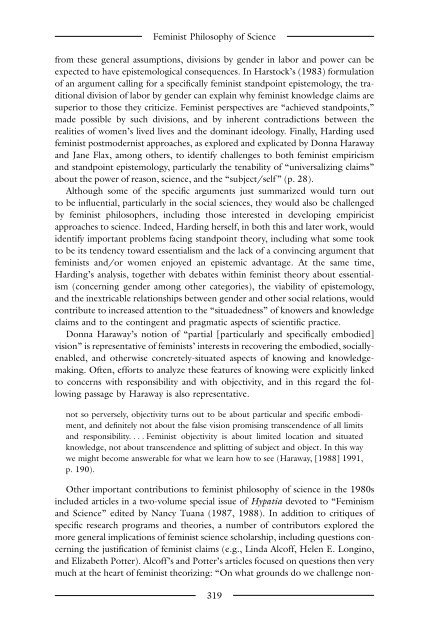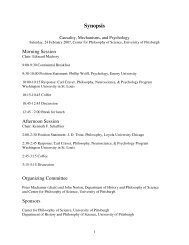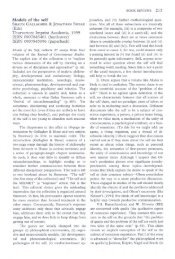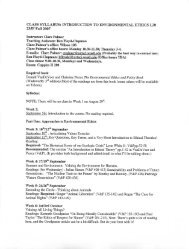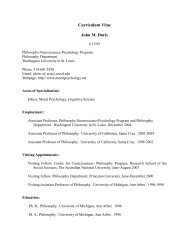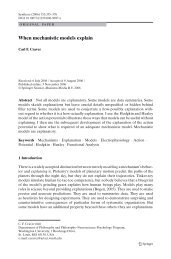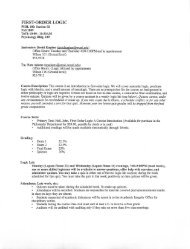The Blackwell Guide to the Philosophy of Science - The Department ...
The Blackwell Guide to the Philosophy of Science - The Department ...
The Blackwell Guide to the Philosophy of Science - The Department ...
Create successful ePaper yourself
Turn your PDF publications into a flip-book with our unique Google optimized e-Paper software.
Feminist <strong>Philosophy</strong> <strong>of</strong> <strong>Science</strong><br />
from <strong>the</strong>se general assumptions, divisions by gender in labor and power can be<br />
expected <strong>to</strong> have epistemological consequences. In Hars<strong>to</strong>ck’s (1983) formulation<br />
<strong>of</strong> an argument calling for a specifically feminist standpoint epistemology, <strong>the</strong> traditional<br />
division <strong>of</strong> labor by gender can explain why feminist knowledge claims are<br />
superior <strong>to</strong> those <strong>the</strong>y criticize. Feminist perspectives are “achieved standpoints,”<br />
made possible by such divisions, and by inherent contradictions between <strong>the</strong><br />
realities <strong>of</strong> women’s lived lives and <strong>the</strong> dominant ideology. Finally, Harding used<br />
feminist postmodernist approaches, as explored and explicated by Donna Haraway<br />
and Jane Flax, among o<strong>the</strong>rs, <strong>to</strong> identify challenges <strong>to</strong> both feminist empiricism<br />
and standpoint epistemology, particularly <strong>the</strong> tenability <strong>of</strong> “universalizing claims”<br />
about <strong>the</strong> power <strong>of</strong> reason, science, and <strong>the</strong> “subject/self ” (p. 28).<br />
Although some <strong>of</strong> <strong>the</strong> specific arguments just summarized would turn out<br />
<strong>to</strong> be influential, particularly in <strong>the</strong> social sciences, <strong>the</strong>y would also be challenged<br />
by feminist philosophers, including those interested in developing empiricist<br />
approaches <strong>to</strong> science. Indeed, Harding herself, in both this and later work, would<br />
identify important problems facing standpoint <strong>the</strong>ory, including what some <strong>to</strong>ok<br />
<strong>to</strong> be its tendency <strong>to</strong>ward essentialism and <strong>the</strong> lack <strong>of</strong> a convincing argument that<br />
feminists and/or women enjoyed an epistemic advantage. At <strong>the</strong> same time,<br />
Harding’s analysis, <strong>to</strong>ge<strong>the</strong>r with debates within feminist <strong>the</strong>ory about essentialism<br />
(concerning gender among o<strong>the</strong>r categories), <strong>the</strong> viability <strong>of</strong> epistemology,<br />
and <strong>the</strong> inextricable relationships between gender and o<strong>the</strong>r social relations, would<br />
contribute <strong>to</strong> increased attention <strong>to</strong> <strong>the</strong> “situadedness” <strong>of</strong> knowers and knowledge<br />
claims and <strong>to</strong> <strong>the</strong> contingent and pragmatic aspects <strong>of</strong> scientific practice.<br />
Donna Haraway’s notion <strong>of</strong> “partial [particularly and specifically embodied]<br />
vision” is representative <strong>of</strong> feminists’ interests in recovering <strong>the</strong> embodied, sociallyenabled,<br />
and o<strong>the</strong>rwise concretely-situated aspects <strong>of</strong> knowing and knowledgemaking.<br />
Often, efforts <strong>to</strong> analyze <strong>the</strong>se features <strong>of</strong> knowing were explicitly linked<br />
<strong>to</strong> concerns with responsibility and with objectivity, and in this regard <strong>the</strong> following<br />
passage by Haraway is also representative.<br />
not so perversely, objectivity turns out <strong>to</strong> be about particular and specific embodiment,<br />
and definitely not about <strong>the</strong> false vision promising transcendence <strong>of</strong> all limits<br />
and responsibility. . . . Feminist objectivity is about limited location and situated<br />
knowledge, not about transcendence and splitting <strong>of</strong> subject and object. In this way<br />
we might become answerable for what we learn how <strong>to</strong> see (Haraway, [1988] 1991,<br />
p. 190).<br />
O<strong>the</strong>r important contributions <strong>to</strong> feminist philosophy <strong>of</strong> science in <strong>the</strong> 1980s<br />
included articles in a two-volume special issue <strong>of</strong> Hypatia devoted <strong>to</strong> “Feminism<br />
and <strong>Science</strong>” edited by Nancy Tuana (1987, 1988). In addition <strong>to</strong> critiques <strong>of</strong><br />
specific research programs and <strong>the</strong>ories, a number <strong>of</strong> contribu<strong>to</strong>rs explored <strong>the</strong><br />
more general implications <strong>of</strong> feminist science scholarship, including questions concerning<br />
<strong>the</strong> justification <strong>of</strong> feminist claims (e.g., Linda Alc<strong>of</strong>f, Helen E. Longino,<br />
and Elizabeth Potter). Alc<strong>of</strong>f’s and Potter’s articles focused on questions <strong>the</strong>n very<br />
much at <strong>the</strong> heart <strong>of</strong> feminist <strong>the</strong>orizing: “On what grounds do we challenge non-<br />
319


